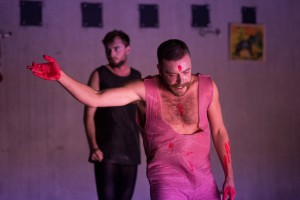University degrees: Postgraduate
Course length: 2 years full-time
Course city: Ludwigsburg
Key objectives of the Acting course at ADK
The Acting curriculum at ADK has been structured to ensure that by the end of their 8-semester course students can acquire the qualification they need to exercise the acting profession. The professional profile of the actor is broadly geared to the diverse techniques and organisational forms of the contemporary stage. (This includes working under a director or as a collective in standard national and municipal repertory companies or in independent structures).
Fostering and training an artistic identity, authorship and responsibility is a particular hallmark of the Acting course at the ADK. Being able to make our own decisions in the work environment, deepening our interest in and fundamental understanding of themes and subject-matter, constantly self-monitoring and growing, honing critical skills, an ability to reflect and a desire to engage with the rest of the company are all essential features in the work of an actor, and consequently they play an important part in training for actors at ADK. The major artistic disciplines foster solid skills and confidence as students analyse texts, study standard monologues and scenes, take part in course-year productions and develop projects.
Cultivating and training the voice, learning speech and breathing techniques, fostering musical skills and tuning into movement are essential to the craft of an actor. They are a permanent thread in this course with regular teaching at all stages. Great value is attached to transferring the skills acquired in these regular classes across to the major artistic disciplines.
The theoretical component – history of theatre, music, fine arts and philosophy – serves to develop intellectual and reflective skills, the ability to think in abstract terms and a cognitive understanding of political, historical and aesthetic questions. These provide an essential foundation for actors to identify their position and evolve an independent artistic personality.
Training for actors in the major artistic disciplines combines teaching formats that reflect the production cycles in a theatre (scene study, stage workshop, graduate production) with ongoing classes in basic subjects (speech, movement, singing). In the major artistic disciplines, the process is supported by integrating active professionals in the training. Work encounters with outstanding contemporary practitioners enable students to develop a relationship with top-quality practice. At the same time, they are encouraged to actively explore a broad range of theatre aesthetics.
Another component here is training for the screen. The stage, the screen and digital media make very different demands of actors today. It is hugely beneficial, therefore, to acquire professional skills and competence in all these fields while training. It is also a fact that video and digital media have long since established a foothold in the theatre, resulting in very particular aesthetic narratives, and this process is set to continue. Students therefore need the skills and an uninhibited artistic response to working with film and digital media. The Screen Acting course is spread across all eight semesters and ranges from basic camera experience and film studies to involvement in professional TV and cinema formats. Students meet experienced cinema professionals working on the international circuit. The Screen Acting course factors in encounters with students at the Film Academy. This encourages and forges professional links that persist long after graduation.
True to ADK’s founding motto Forge Bonds, the training for our Acting students regularly overlaps with and complements the courses devoted to Directing, Dramaturgy and Stage & Costume Design (the latter based at ABK Stuttgart). At the start of the course, students of Directing, Dramaturgy and Acting attend the same basic lessons. From the 2nd year onwards, Acting students regularly perform in the technical exercises and graduate shows of fellow students on the Directing course. One intended benefit of this collaboration is that researching together results in fresh formats, theatre idioms and new approaches to the theatre as an organism and other working environments, over and above existing models and structures.
The Acting course is enriched by input from working experience with other techniques: physical theatre, dance, clowns, performance, documentary theatre, etc. This input occurs both during the principal course (up until the graduate production in the 7th semester) and in the 8th semester.
Aptitude test, duration of course and graduation project: After passing the admission test by convincing ADK teachers that they possess enough acting talent and development potential, 8–12 Acting students will form a class and remain together for eight semesters. At the end of their training, in the 7th semester, students take part in a graduation project, productions by fellow-students and a final show, giving them an opportunity to showcase their work to theatre managers, directors, producers and agencies etc. The Acting course at ADK leads after eight semesters to a Bachelor of Arts.
